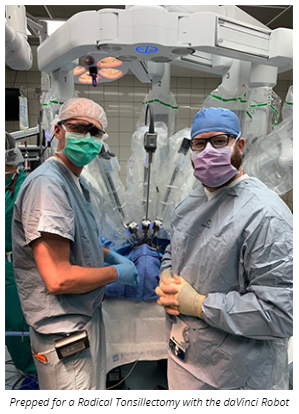Are You Losing Your Hearing? Time to Consult a Hearing Expert
Wiki Article
Exploring the Area of Otolaryngology: What to Expect When You Speak With an ENT
Otolaryngology, generally described as ENT, encompasses the medical diagnosis and therapy of throat, nose, and ear problems. For those experiencing relevant problems, speaking with an ENT specialist can offer quality and alleviation. Recognizing what to expect during such examinations is necessary for reliable interaction and treatment. This introduction will lay out crucial facets of the ENT experience, consisting of common factors for visits and the procedures included in medical diagnosis and treatment.
Recognizing Otolaryngology: A Review
Otolaryngology, commonly referred to as ENT (Ear, Nose, and Throat) medicine, is a customized branch of medication that concentrates on the diagnosis and treatment of conditions affecting these essential locations of the human body. This area includes a large array of conditions, including those relevant to hearing, equilibrium, respiratory system function, and speech. Otolaryngologists are educated to handle both medical and surgical therapies, using sophisticated methods and innovations. Their knowledge extends past traditional conditions, addressing concerns such as allergic reactions, sinus infections, and hearing loss. Furthermore, they play a critical duty in the monitoring of head and neck cancers, supplying extensive treatment customized to individual patient needs. Generally, otolaryngology remains important for maintaining health and high quality of life in damaged people.Usual Factors to See an ENT Expert
Many individuals look for the know-how of an ENT expert for a selection of reasons, reflecting the varied nature of conditions that impact the nose, throat, and ear. Usual concerns consist of persistent sinusitis, which typically causes consistent nasal blockage and face pain. Allergies and their connected signs, such as itching and sneezing, also motivate visits to these experts (Otorrinolaringologia). Hearing loss, whether unexpected or gradual, is another significant factor for assessment. In enhancement, individuals may look for evaluation for throat disorders, including relentless hoarseness or ingesting difficulties. Rest apnea, defined by interrupted breathing during rest, is frequently addressed by ENT professionals also. Each of these problems highlights the significance of specialized care in handling complicated ENT-related health and wellness concerns
Preparing for Your ENT Consultation
When getting ready for an ENT appointment, it is necessary to collect relevant info and think about any kind of certain worries. Clients must compile a comprehensive clinical history, consisting of previous ear, nose, or throat concerns, surgical procedures, and existing medications. Recording symptoms-- such as seriousness, period, and frequency-- can offer useful insights for the ENT professional. In addition, people need to prepare a checklist of concerns they want to ask, guaranteeing that all concerns are dealt with throughout the go to. Bringing along any relevant medical documents or test results can additionally help the ENT in understanding the patient's condition. Patients must validate their appointment information, including date, place, and time, to reduce any final complication. Correct preparation can enhance the efficiency of the assessment and result in far better results.What to Expect During the Examination
As the consultation begins, the individual can anticipate to involve in a detailed conversation with the ENT specialist regarding their signs and case history. The professional will ask about the duration, frequency, and intensity of symptoms such as hearing loss, nasal congestion, or sore throat. Furthermore, the individual's previous clinical conditions, medicines, and any kind of appropriate household background will certainly be examined, assisting the professional in forming a complete understanding of the patient's health and wellness. The ENT may likewise ask regarding lifestyle elements, such as direct exposure to toxic irritants or irritants. This open dialogue establishes a foundation for the assessment, making sure that the person's concerns are attended to and setting the the voice karaoke phase for any required evaluations or suggestions for therapy.
Diagnostic Tests and Treatments in Otolaryngology
A range of diagnostic tests and procedures are important in otolaryngology to accurately evaluate and detect problems impacting the ear, throat, and nose. Typical examinations consist of audiometry, which determines hearing function, and tympanometry, analyzing center ear stress. Nasal endoscopy permits visualization of the nasal flows and sinuses, while laryngoscopy examines the throat and vocal cables. Imaging techniques, such as CT scans and MRIs, give thorough sights of head and neck structures. Allergy testing may additionally be conducted to identify triggers for sinus or respiratory system problems. These diagnostic tools allow ENT professionals to establish an extensive understanding of people' conditions, ensuring customized and effective administration plans. Correct diagnosis is vital for effective treatment end results in otolaryngology.Treatment Alternatives Used by ENT Specialists
ENT specialists use a range of treatment alternatives customized to deal with particular problems influencing the nose, ear, and throat. These therapies range from traditional approaches, such as medicine and way of living adjustments, to even more intrusive treatments. Allergies may be taken care of with antihistamines or immunotherapy, while chronic sinus problems may need nasal corticosteroids or sinus surgery. For hearing loss, ENT experts usually suggest listening devices or surgical interventions like cochlear implants. In cases of throat disorders, options can include speech treatment or medical procedures to eliminate blockages. Furthermore, they might provide assistance for taking care of rest apnea, including using CPAP devices or medical interventions. On the whole, the objective is to improve clients' lifestyle through individualized treatment and efficient therapy techniques.When to Seek Follow-Up Care With an ENT
When great site to look for follow-up treatment with an ENT specialist is important for managing recurring signs or issues related to throat, nose, and ear problems, identifying. People should think about arranging a follow-up consultation if symptoms persist regardless of preliminary therapy, such as persistent ear discomfort, nasal congestion, or throat discomfort. Changes in hearing, equilibrium concerns, or unusual nasal discharge may also necessitate further examination. Additionally, if a patient experiences negative effects from prescribed medications or has actually undergone an operation, follow-up care is essential to keep track of recovery and attend to any issues. Prompt appointments can assure efficient monitoring of conditions, stop possible complications, and offer tranquility of mind concerning one's health. Seeking follow-up care promotes aggressive health and wellness monitoring in otolaryngology.Often Asked Questions

What Qualifications Should I Look for in an ENT Specialist?
When seeking an ENT expert, one ought to look for board certification, appropriate experience, and strong patient reviews. Furthermore, reliable communication skills and a compassionate technique can substantially boost the overall treatment experience.How Do I Pick the Right ENT for My Requirements?
Choosing the best ENT expert includes evaluating their credentials, experience, and individual testimonials (ENT Doctor). It is crucial to ponder their communication style and method to therapy, ensuring they align with the person's details health requirements and preferencesExist Any Kind Of Dangers Related To ENT Procedures?
The risks linked with ENT treatments may consist of infection, bleeding, anesthesia issues, and possible damage to surrounding structures. Clients need to go over these dangers with their doctor to understand private problems and warranty notified decisions.How Can I Handle Anxiety Before My ENT Visit?
To manage stress and anxiety before a consultation, individuals can exercise deep breathing workouts, picture favorable outcomes, prepare inquiries beforehand, and seek support from pals or family members, fostering a feeling of peace of mind and calmness.What Should I Do if I Experience Negative Effects From Therapy?
The person needs to promptly report them to their medical care provider if side impacts from treatment take place. Adjustments to therapy or additional interventions may be necessary to ensure safety and effectiveness in handling their problem - Hearing. As the examination starts, the person can anticipate to engage in a complete conversation with the ENT professional about their signs and symptoms and medical history. These diagnostic devices make it possible for ENT professionals to establish a detailed understanding of clients' problems, making certain tailored and efficient administration plans. ENT specialists provide a range useful source of therapy options tailored to attend to specific conditions affecting the throat, ear, and nose. When looking for an ENT expert, one ought to look for board certification, pertinent experience, and strong patient reviews. Choosing the ideal ENT expert entails examining their qualifications, experience, and patient testimonialsReport this wiki page